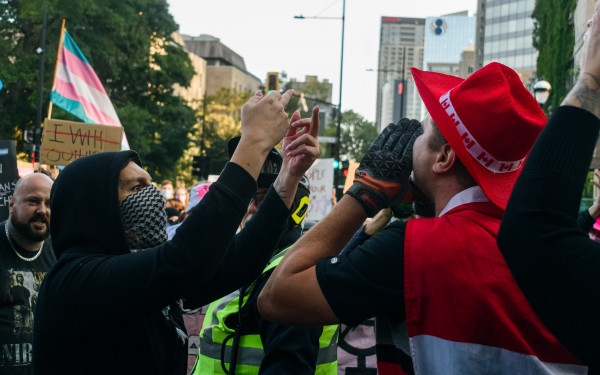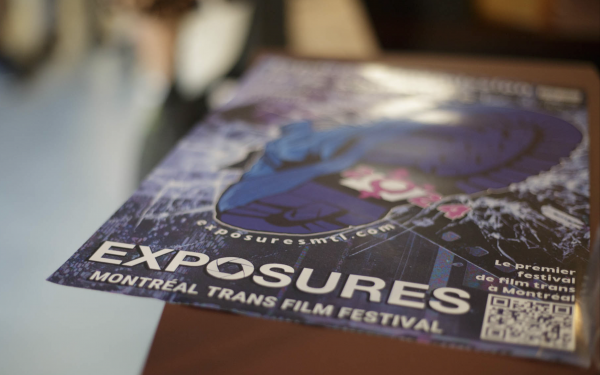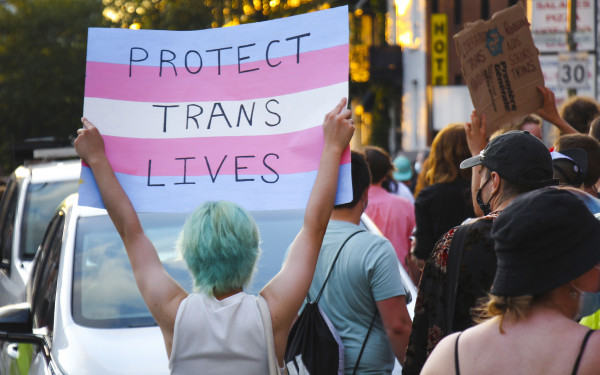Basics beyond the binary
Rae Hill has spent most of their life reshaping gender-affirming fashion
The remnants of work linger in Origami Customs’ old factory room.
Sewing machines rest patiently at their stations, foot pedals tucked beneath them, spools of thread lined up in quiet anticipation. The rhythmic ticking of a machine hums in the background.
It’s a Saturday, and the workshop is empty, its stillness only briefly interrupted by our presence.
Sitting on a small stool, Rae Hill gently holds the fabric down with two fingers, adjusting their grip every few seconds to guide it smoothly under the machine’s humming needle. Their foot presses lightly on the pedal as the needle rises and falls, piercing the fabric in precise, even stitches. Their eyes shift in and out of focus, sometimes following the seam closely, other times drifting as muscle memory takes over. The machine, the fabric, and their movements become one—a seamless rhythm, a perfect symbiosis. Five minutes to take shape, 10 minutes to hold form, and 15 years of underwear.
Hill is the creator of Origami Customs, a Montreal-based company specializing in creating custom products for a gender-diverse audience. The team is made up of eight queer and trans individuals who are trained in crafting personalized items tailored to the unique needs of their customers.
“We have created patterns over the last 15 years that support people in their authentic expression, but also to make them feel comfortable and safe when they're using these products,” Hill says.
The underwear industry has seen a growing demand for health-conscious designs that prioritize comfort and breathability—trends that Origami Customs has been incorporating into their products for years. According to a report by Cognitive Market Research, this shift is reflected in the broader market, where North America accounted for over 40 per cent of global underwear sales in 2024, generating $43 billion in revenue.
Unlike the trained professionals in the workshop, you don’t need to be an expert in customization to get the perfect fit. On Origami’s website, you’ll find an easy-to-follow guide that shows you exactly how to take your measurements. Once entered, the measurements are saved for future orders.
“Even in the manufacturing process, we often have people say, ‘I started HRT (Hormone Replacement Therapy) and my body is really different than it was a couple of weeks ago when I ordered this piece. Can you update my measurements?’ And we're always happy to make modifications for people because we understand,” Hill adds. “It’s a really beautiful part of working for, with and by trans people in every step of the process. There’s a lot of empathy and understanding for what people are going through, and we're creating garments that we wear ourselves.”
Origami Customs began as a swimwear business on the coast of Honduras, where Hill took a longer-than-expected gap year after falling in love with scuba diving in a small town called Utila. What started as making swimsuits for themself and friends quickly grew into a small boutique in a tight-knit scuba diving community.
After a few years spent in the laid-back rhythm of Honduras, Hill moved from the quiet corners of the island to the more dynamic pace of Costa Rica. There, they connected with many people in the clothing industry, which led them to learn more about online selling. Using the online platform, Etsy, they tapped into a new audience—bigger than the small boutique they had been running. As the business grew, so did their vision, and eventually, Montreal became the next stop for expansion and rebranding.
Then the pandemic hit and Hill saw a shift in the market. Hostility toward the trans community grew, and they realized the need for a decisive change: to dedicate Origami Customs to serving trans people. With so few businesses catering to this need, it was about creating a space where trans people could be prioritized and understood.
Holding up a ready-to-ship gaff, a specially designed piece of underwear that helps flatten the genital area for transgender women and create a smoother, more feminine appearance, Hill shows me the difference in the fabric. They explain that garments like these, or compression binders, can become restrictive or harmful if not designed properly.
“A lot of my friends were like, ‘We see you designing all these pieces, but we’ve been DIY-ing our own stuff for a really long time. Can you help us design swim shorts that you can wear a packer with? Or like a binder or gaffe?’” Hill says. “And I was like, ‘Actually, yes, this is my specific skill set.’”
“When a video of a trans woman in underwear gets flagged, but Victoria’s Secret can post whatever they want, this is an issue that we need to be talking about. Why are people not noticing?” — Rae Hill
Hill’s designs are driven by both function and community needs, blending practicality with comfort.
“This is one of my favourite pieces, it’s a jock, so this is made out of bamboo as well, with a nice thick waistband, double gusset in the front and then, like, a totally open butt in the back, which I love,” Hill says.
Origami Customs also offers free underwear to community partners worldwide, ensuring that those who can't order directly from the website still have access to the products.
Wrapping up the tour, Hill settles onto the well-worn couch in the dining area, sunlight streaming across our conversation. While they’ve stepped back from the hands-on making process in recent years, Hill’s focus has shifted to advocacy, speaking on topics like gender diversity in the workplace, sustainable fashion and gender-affirming clothing. Despite their enduring passion, recent years have been challenging. Hill highlights how algorithm changes have fuelled an increase in transphobic discourse, from the lack of hate speech moderation to their posts being flagged.
“When a video of a trans woman in underwear gets flagged, but Victoria's Secret can post whatever they want, this is an issue that we need to be talking about. Why are people not noticing?” Hill says.
By collaborating with professionals, they’re able to implement new policies and approaches that specifically address the needs of the gender-diverse community, using their own experiences as what they call “a roadmap” for others to follow.
“What we have in the studio is a really specific microcosm and space, where we've essentially decided that primarily it will be a place to support gender-diverse, queer and trans people,” Hill explains.
Beatrice Warner, a customer of Origami Customs and an occasional model for the small business, says that underwear is typically designed with either a cisgender male or female body in mind, even when custom-made.
“It’s really important to me as a customer that I have an option for me, not only coming from someone who is trained specifically to work with bodies like my own but also, frankly, people who have bodies like my own, so they can really experience it for themselves,” she says.
Warner reflects on her initial reaction to Hill’s modelling offer as a moment of clarity. She recalls how it suddenly felt real. It wasn’t just about posing or showing her body—it was about revealing who she truly was. For her, this was deeply connected to the dysphoria she’s long struggled with.
"I felt not only comfortable, but I felt sexy, beautiful and powerful because I felt safe with the other models, and safe with the photographer because of the atmosphere that was being created, which, of course, was led by Rae," she says.
Once the pictures were revealed, Warner said she felt “energetic” about the shoot. For her, it wasn’t just about the underwear or the photos; it was about the incredible energy of the project itself and what it conveyed.
“I feel like there’s a huge gap especially when it comes to queer bodies in the mainstream clothing industry, so it is very important to have a company like this that is actually catering to their audience in a way that actually fits our needs,” Taj Taylor says, a past content collaborator with Origami Customs. “I was really impressed by the quality of the material, the fact that it's custom-made and the fact that it's by queers for queers, I absolutely love that about them.”
As we lock up for the weekend, the workshop quiets, but Hill’s work is far from over—with trans advocacy talks on the horizon and policy-making projects in motion. Their work doesn’t end when the sewing machines go silent.
“We are trans. This is a trans-run company that's trans-made, and we’re making garments that are very popular because they don't exist in the world,” Hill says.







_600_375_90_s_c1.jpg)